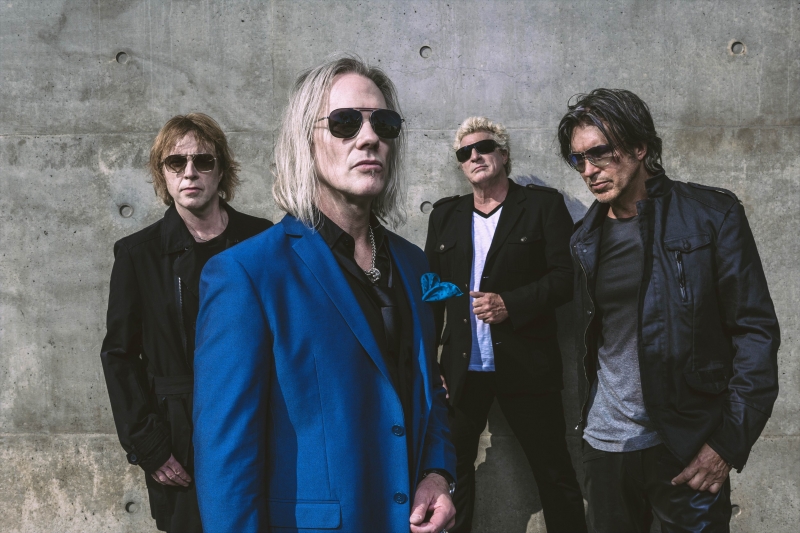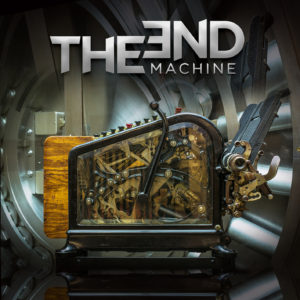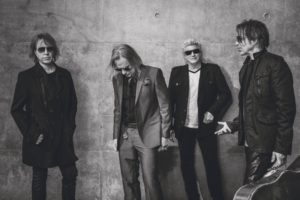
The long-standing and ongoing friendship and musical collaboration between guitar wizard George Lynch and bassist/producer Jeff Pilson continues with the recent release of their latest melodic rock project – The End Machine.
The band’s self-titled album was released in March through Frontiers Music SRL and features not only the long-time guitar and bassist from the classic lineup of veteran 1980s rockers Dokken, but also the band’s once and current drummer, Mick Brown. The trio was augmented by the powerhouse vocals of current Warrant frontman Robert Mason, to create an album filled with 11 masterful pieces that highlight the best of the hard rock energy of the 1980s and 1990s, with a very modern, straightforward and badass 21st century vibe.
“Jeff and I are always searching for a reason to sit down and have fun in the studio, so we found one. Initially I think we thought it might be a Dokken record. We were negotiating with Frontiers regarding a Dokken reunion album, after we did those reunion shows back in 2016, and it got very close to being a reality. But it ended up not happening and we switched gears and Robert agreed to come on board, and I am very glad he did, as the results speak for themselves,” said Lynch.
“It won’t be the last time Jeff and I find some way to make a record, whether it’s Lynch/Pilson, T&N, Dokken or The End Machine. Jeff’s even worked with me on Lynch Mob records before. We just like working together and writing together; we’re a good songwriting team. As for the Dokken album, I think ultimately Don [Dokken, the band’s founder and frontman] didn’t want to do it. And there could be a lot of reasons for that. I hate to say what could have been, but I think we realized through the initial compositional process that it was going to be a very nice body of work, one that might serve the Dokken brand very well if it were made into a Dokken record.”
Mason was also a pal of Pilson and Lynch, with a proven track records as a vocalist and songwriter. So, it was a seamless fit, and one that added a different sonic and stylistic dimension to the band, as compared to if it had been a straightforward Dokken reunion project.
“Robert Mason, I gotta say, he brought it to a whole other level. I was ecstatic the way the record turned out and about what Robert and Jeff did. They worked really closely on the vocals, which is why it sounds so amazing. I can’t take any credit for that; I wasn’t involved in that part of the writing or recording,” said Lynch.
 “Robert has done a bunch of Lynch Mob dates with us, although not much recently. We thought perhaps Michael Sweet [Stryper] might be a good choice because Michael and I have done the two Sweet & Lynch records together and Jeff and I thought he would be great in place of Don if Don doesn’t want to do it. But Robert really was our first choice. He has this aggressive style that I really like. I like that he can do what Don does, which is be very melodic and sing a ballad and all that kind of thing and that’s wonderful, you want that. But also, he is able to turn it up too, which is nice. And not that Michael can’t turn it up, it’s just that Robert is a little more bluesier and greasier than Michael or Don. Michael is a little more operatic, and I appreciate what he does, but if I had to choose one over the other, I would prefer the bluesier side of things – that’s just my personal taste.
“Robert has done a bunch of Lynch Mob dates with us, although not much recently. We thought perhaps Michael Sweet [Stryper] might be a good choice because Michael and I have done the two Sweet & Lynch records together and Jeff and I thought he would be great in place of Don if Don doesn’t want to do it. But Robert really was our first choice. He has this aggressive style that I really like. I like that he can do what Don does, which is be very melodic and sing a ballad and all that kind of thing and that’s wonderful, you want that. But also, he is able to turn it up too, which is nice. And not that Michael can’t turn it up, it’s just that Robert is a little more bluesier and greasier than Michael or Don. Michael is a little more operatic, and I appreciate what he does, but if I had to choose one over the other, I would prefer the bluesier side of things – that’s just my personal taste.
“And that’s the way I write too. This stuff is a little more groove based, less cerebral and coming a little more from the heart and groin.”
Having Brown involved was just icing on the proverbial cake, as he brought his inimitable style and ‘in the pocket’ musical rapport with fellow bottom-ender Pilson to The End Machine.
“Not too many people do what Mick does and not too many people do what Jeff does. They both have this kind of old school thing about their playing and their groove and their sound. Mick has always had that solid bottom thing, you know, and he is just great at it. And he does it in his own way. There are not too many guys that do that, so your choices are really limited. I have played with a lot of drummers and they’re all great in their own way, but none of them does what Mick does, that I have experienced anyway,” Lynch said.
“We really wanted that vibe and he shines on this record. The sound that Jeff got as the engineer on the drums from Mick just complemented his playing so much. And I think Mick actually played beyond himself on this record. He really stepped up to play at a level that I hadn’t heard him play in a long, long time.”
As stated earlier in this piece, Pilson and Lynch carried much of the compositional and recording load, but because all four members of The End Machine are season pros, even the material that was recording elsewhere and ‘flown in’ sounds like it was all recorded in the same facility at the same time.
“During the recording process, at no time were the four of us together. Jeff and I wrote everything with programmed drums in his studio, like we always do. And Jeff is like a Swiss army knife kind of guy – he does it all. He plays guitar, bass, he sings, plays keyboards, engineers – anything and everything. And I just do one thing, I play guitar,” Lynch said with a chuckle.
“So, between the two of us, we basically got a whole band right there, with Jeff being about 80 per cent of that band. We go through that process and we write everything relatively quickly: I would say about a song a day, sometimes more. Then the second phase was we brought Mick in and Mick knocked everything out in like, three days. And then I came in and did the rhythm guitar and some lead overdubs.
“A lot of the stuff I did initially I kept, but sometimes we would like to have a second guitar, or some parts of the original bed track might be a little sketchy so we would fix them up then. And of course, I need to do all of my solos and some other additional ear candy parts. Then Robert comes in after all that and he and Jeff just hunkered and woodshedded together on the vocals and harmonies. And they did the lyrics too, I had nothing to do with vocals or lyrics.”
So, to clarify, while The End Machine is three parts Dokken and one part Warrant, the music is a combination of the collective influences and experiences of all four band members. Lynch has innumerable credits under his belt, including the aforementioned Lynch Mob, with more than a dozen albums, including 2017’s The Brotherhood, as well as just as many solo records, KXM (with Ray Luzier of korn and dUg Pinnick of King’s X] and many others. Pilson has produced many artists and has been the bassist for Foreigner for more than 15 years, while Brown had an extended stint with Ted Nugent, before recently returning to Dokken. Mason has been with Warrant for a decade and has had three stints in Lynch Mob since 1991.
“It’s ¾ Dokken, but it’s also ¾ of Lynch Mob. It’s Jeff Pilson on bass and the rest of Lynch Mob. So, you hear elements of that in The End Machine, but we’re not thinking of any of that when we’re writing. Probably the hardest thing for me to do is try to replicate something I have already done, and who I was 30 or 35 years ago. I have had more than one project where people have come to me and want to hire me to play on some record or write and play something that sounds like that 1980s Dokken thing, like Breaking the Chains or Tooth and Nail or Under Lock and Key. But it’s like, all of those molecules are back in the atmosphere, dude. I am a different person. And I get why people ask, because I don’t like my heroes to change either. I have been disappointed with the trajectory of Eric Clapton’s playing and I hate to say that, but I know a lot of people feel that way, because he became more of a singer/songwriter guy rather than the badass that he was in Cream and Blind Faith,” he said.
“So, I get that. I see that everyday on Instagram or Facebook or whatever, and people are always wanting me to do things like I did in the 1980s. I get it, but I think unless you’re naturally designed to just continually be the same thing that you always are, and I think some people can do that – unless you are wired that way, basically its disingenuous and insincere because then you’re just replicating something. You’re basically doing a tribute, or even a parody of yourself. I get it, you’re just trying to pay the bills and that’s your brand and there’s nothing wrong with that. But I guess I am not built that way.
 “But, listen, it’s not like all of a sudden I am going to become a Rastafarian hip-hop player. I grew up with R&B and blues and punk music and classical music, flamenco guitar and surf music. A little later, and I think you can hear this through all my records, it became things like Fu Manchu and Blue Cheer when I was growing up, cutting my teeth and playing backyard parties and local battle of the bands in my teens. It was stoner rock is really what it is. And I realized that’s what I loved and that’s what I still gravitate to. So, there’s all those elements, that’s what I am really about. And in my post-Dokken years, because I can, I am able to play with a variety of different people, which is really exciting and fun and challenging. It keeps me thinking, keeps me on my feet and keeps me growing. And I don’t think it’s self-indulgent, it’s just a natural course of action for me as a musician and an artist.”
“But, listen, it’s not like all of a sudden I am going to become a Rastafarian hip-hop player. I grew up with R&B and blues and punk music and classical music, flamenco guitar and surf music. A little later, and I think you can hear this through all my records, it became things like Fu Manchu and Blue Cheer when I was growing up, cutting my teeth and playing backyard parties and local battle of the bands in my teens. It was stoner rock is really what it is. And I realized that’s what I loved and that’s what I still gravitate to. So, there’s all those elements, that’s what I am really about. And in my post-Dokken years, because I can, I am able to play with a variety of different people, which is really exciting and fun and challenging. It keeps me thinking, keeps me on my feet and keeps me growing. And I don’t think it’s self-indulgent, it’s just a natural course of action for me as a musician and an artist.”
As for The End Machine playing live, Lynch said promoters in Japan had already made some offers for a tour in the fall, which could extend over into North America.
“We’re just in the exploratory stages of organizing all that. It is very tricky and very challenging to find time when everybody is in other bands. But we’re going to make a very concerted, serious effort to make that happen. We decided very early on that we wanted to not just be a recording project, but put some legs on it and put it out there,” he said, adding that a prospective set list would see four or five Dokken tunes, five from The End Machine album, a number of Lynch Mob hits and a few other songs, perhaps even covers.
Besides The End Machine, Lynch’s calendar continues to be filled with various projects. He said there is unlikely to be a third Sweet & Lynch album, primarily because both parties are exceedingly busy. A third KXM album, entitled Circle of Dolls, is in the can and will be released sometime in 2019, as is another Frontiers studio project called Dirty Shirley. Preliminary writing has begun on what could either be a solo George Lynch instrument album or another Lynch Mob record,
“And I build guitars in my spare time, and I also have this thing called a family – those other people I occasionally see in my house. I imagine they wonder who the old man is wandering around playing guitars all the time,” he said.
For more information on The End Machine, visit https://www.facebook.com/TheEndMachine.
For more information on Lynch, Lynch Mob and his other activities, visit https://georgelynch.com/wordpress.
- Jim Barber is a veteran award-winning journalist and author based in Napanee, ON, who has been writing about music and musicians for a quarter of a century. Besides his journalistic endeavours, he now works as a communications and marketing specialist. Contact him at jimbarberwritingservices@gmail.com.
SHARE THIS POST:
